In the world of acting, getting a coveted role is not an easy task, regardless of whether or not you are experienced. An actor’s main priority at an audition is to increase their chances of getting the desired role.
Presenting a headshot alone is not enough, as every other aspiring actor will probably do the same. A simple tool you can use to increase your chances is a well-written resume. The resume allows you to share your unique skills, experiences, and training with the casting director. Such details help show exactly what sets you apart from other candidates interested in the role.
Though some may think an acting resume is unnecessary because of the nature of the job, you would be surprised to know that casting directors appreciate a well-composed resume. But to determine how you can use it to your advantage, you must first understand what it is, why you should write one, and how you can write one. You can learn how to write it by following this article.
What is an Actor’s Resume?
An actor’s resume is a document used to market your skills and experiences as an actor by telling the casting director about your acting experience and mentioning all noteworthy roles that you have played, special skills like stunts you can perform, training you have received, and awards you have received.
It is used when auditioning for roles in television, theater, and film. A resume for an actor differs from other types of resumes in that it includes an 8×10 headshot. It also contains your contact details and those of your representative or agent, if you have one, and should not be more than one page long.
Why do You Need It?
An acting resume helps show your potential as an actor to the casting director. Through the experiences and skills indicated in the resume, you can show why you are perfect for the role. It also helps you demonstrate what additional skills you have. If, for example, you perform various stunts, it means that the production is likely to save money by hiring you as there will be no need for a stunt double. It can also help you get a second audition.
Exclusive Templates

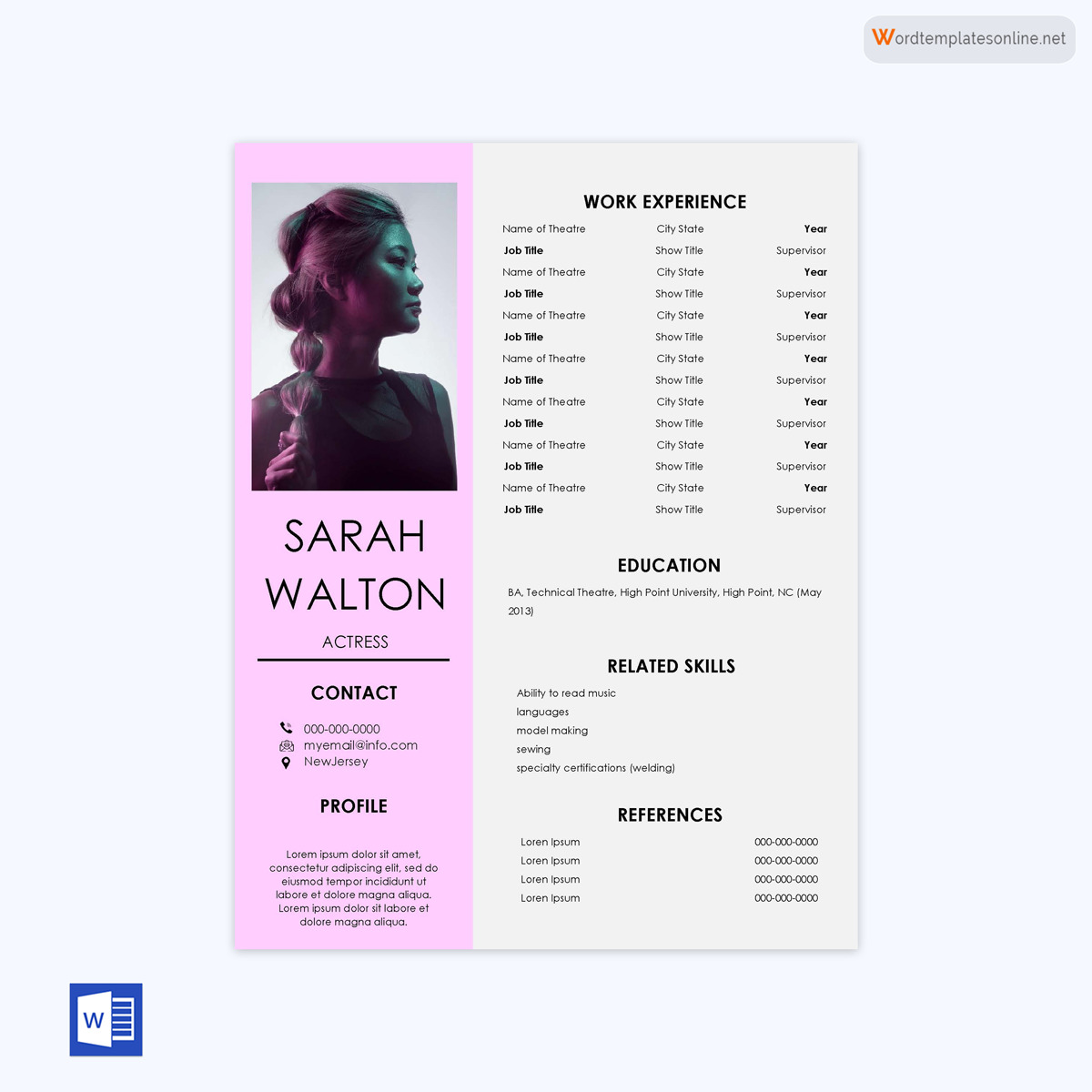



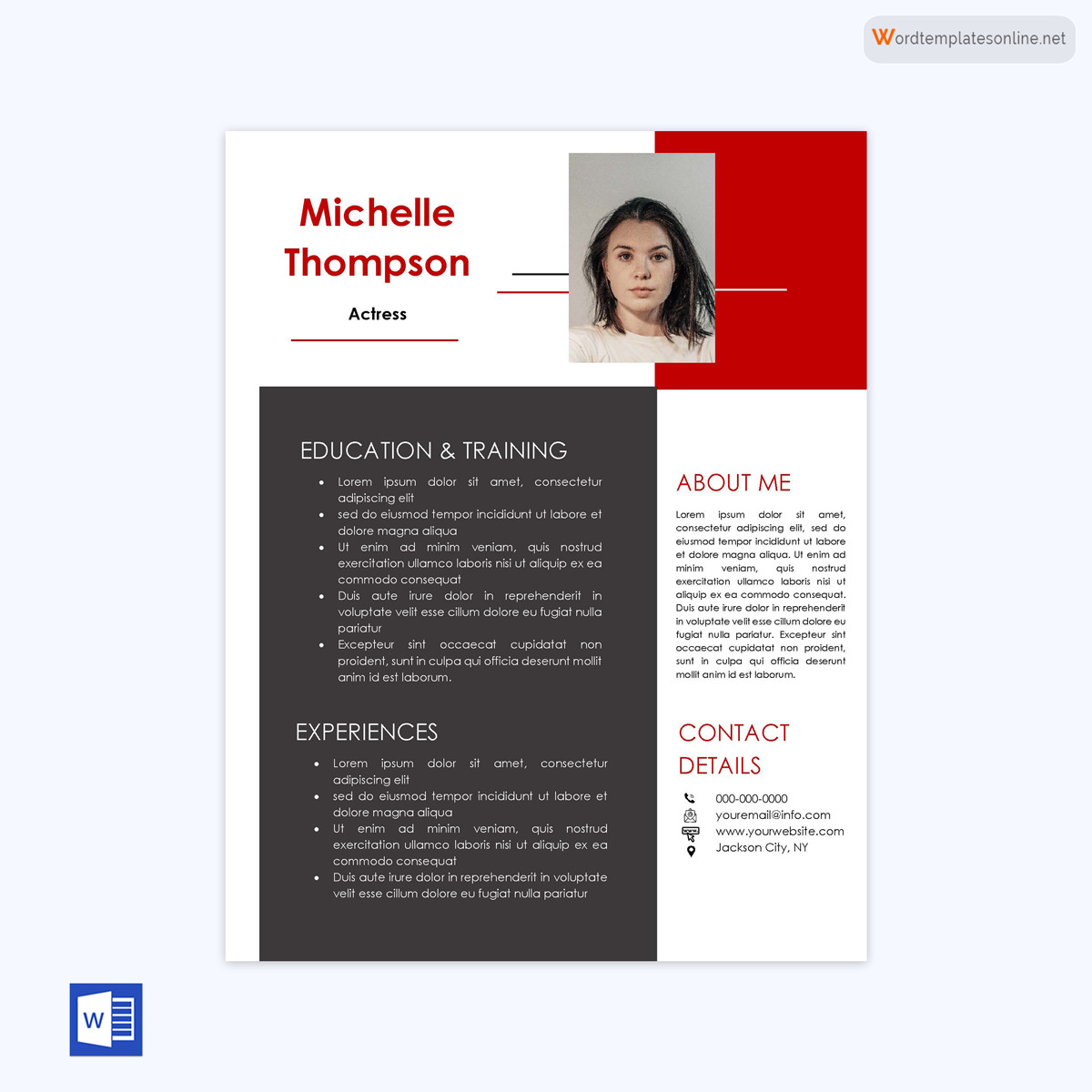
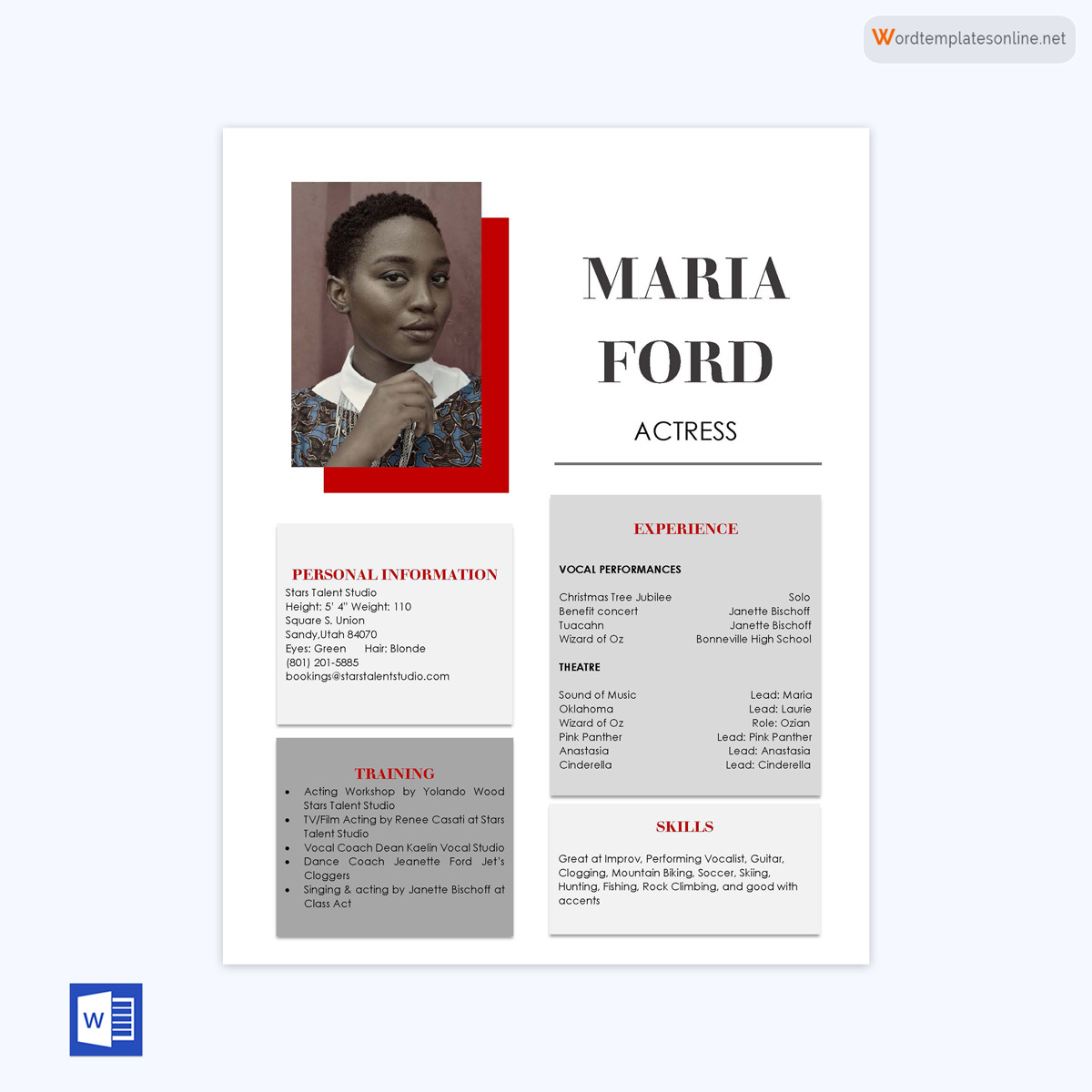
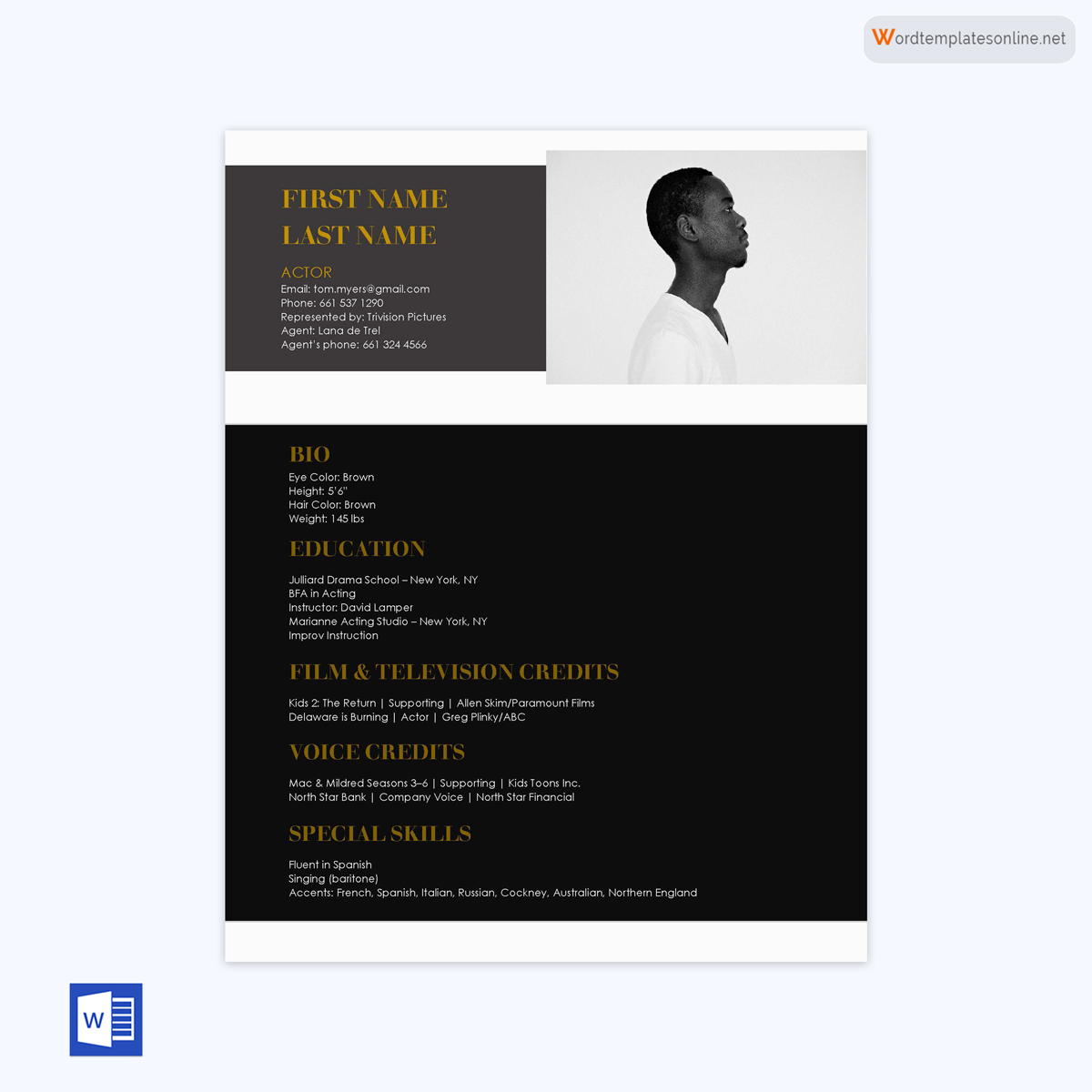

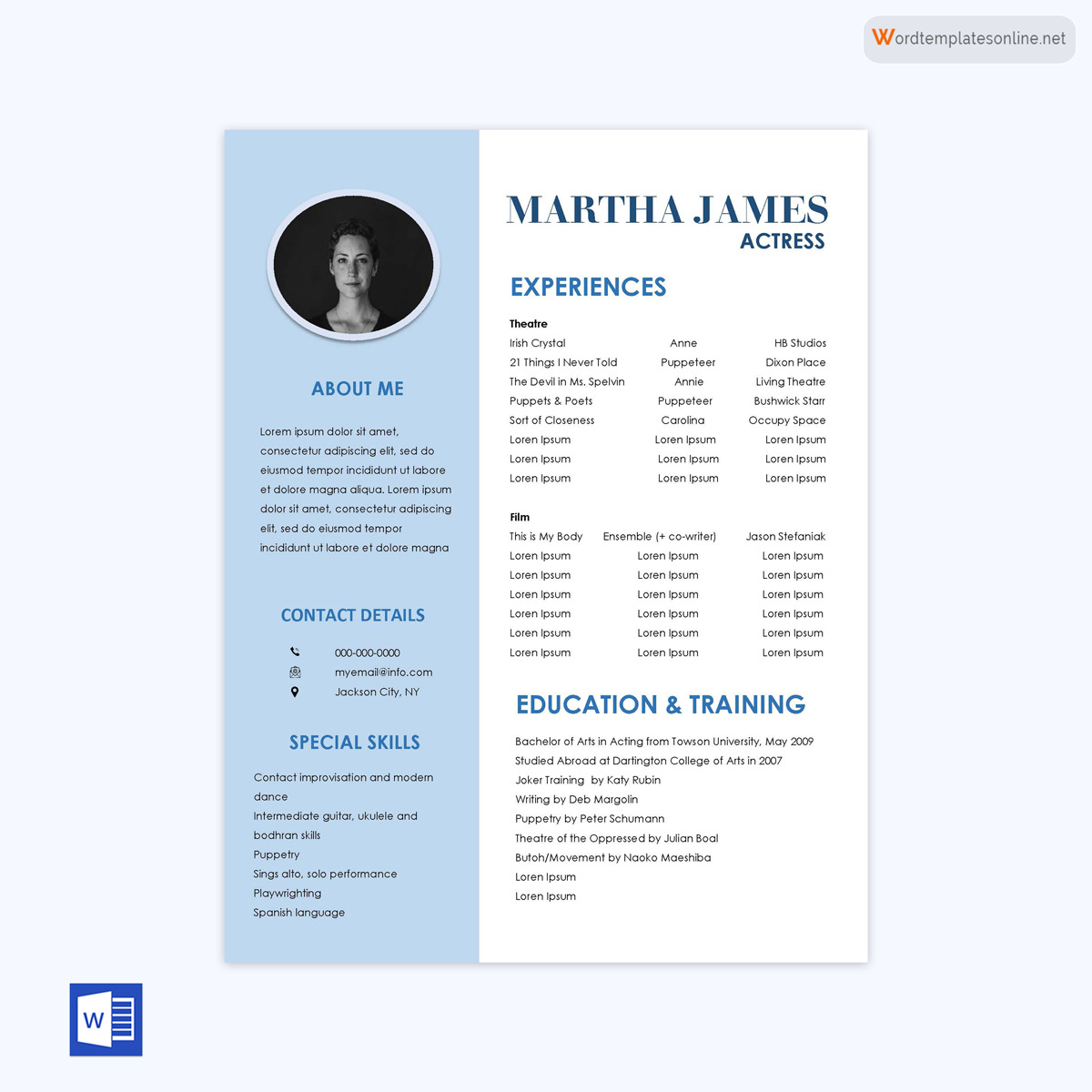
Essential Components of an Actor’s Resume
An actor’s resume is a critical marketing tool used to showcase their experience, training, and skills to industry professionals, such as casting directors and agents. The acting resume typically includes personal information, physical attributes, professional experience, training, skills, and awards and achievements. The key to an effective actor’s resume is to keep it up-to-date and tailored to the specific role or production the actor is auditioning for.
In the following sections, we will take a closer look at each of the essential components of an actor’s resume:
Personal information
You should begin the writing process by providing your full name and contact information. The details should include your phone number, professional email, and address, including your city and state union affiliations (if applicable, such as SAG-AFTRA). You should also include your agent’s or representative’s contact information if you have one.
EXAMPLE
Actor
John smith
New York, NY
555-555-5124
johnsmith@email.com
Agent
Mark White
567-432-5829
markwhite@email.com
Union affiliations (if any)
Physical attributes
Secondly, you should provide your physical attributes and statistics. The attributes will include your height, weight, eye, and hair color, and other distinguishing features like visible tattoos or scars that are difficult or impossible to change. You should only indicate your age if you are under 18. The role you audition for will determine whether other details like clothing size and vocal type are necessary.
EXAMPLE
Height: 6’2
Weight:180
Hair color: Blond
Eyes color: Blue
Professional summary
The purpose of this section is to provide a brief overview of the actor’s experience, skills, and accomplishments, and to capture the attention of casting directors or agents who may be quickly scanning through a large number of resumes.
The professional summary or profile section should be concise and well-written, typically consisting of two to four sentences that highlight the actor’s most impressive qualifications and unique selling points. By placing this section near the top of the acting resume, the actor can quickly demonstrate their value to potential employers and increase the likelihood of being selected for auditions or roles.
EXAMPLE
A hardworking, passionate actor with five years of experience in television and film. Capable of bringing the character to life through research, preparation, and attention to detail. I am also able to deliver high-pressure performances by improvising when required.
Professional experience
This is perhaps the most important section of an actor’s resume, as it provides a summary of their work as an actor. This section typically includes the name of the production, the role played, the name of the production company, the director’s name, the type of production (TV, film, theater, etc.), the location of the production (city and state), and the production’s year.
EXAMPLE
Roles credits
Film:
- “To the moon and back,” protagonist, Captain Alan Green
- “Last Love,” Principal, Sir Richard
- “Red-light,” supporting, Mr. Banks
Television:
- “Casino,” season 3, featured Justin Vain
“Dollhouse,” season 4, voice-over, Woody
Theatre:
- “King Arthur,” Arthur, West Side Theater Company
- “Sun and Moon,” Harper, Green Street LLC
- “Last Run,” Matthew, Star Bright Theater Group
note
Speaking and non-Speaking roles: You should also indicate which of the roles indicated is speaking or non-speaking. Speaking roles include lead, principle support, and voice-over roles. Non-speaking roles include featured, extra, stunt performer, body double, and stand-in roles.
Include education and training
Your education and training experiences should be listed in the resume as well. This section lists any formal training the actor has received, such as acting classes, workshops, or degrees in acting. When indicating the training you have received, it is important to highlight what kind of training you have obtained, like stunt coordination, scene study, and improv training.
EXAMPLE
Education
- Bachelor of Arts (BA) in Theater or Drama
British School of Performing Arts (2019)
Training
- Acting Technique Workshop, The Actor’s Studio, Los Angeles, CA (2021)
- Audition Technique Intensive, The Studio for Performing Arts, Atlanta, GA (2017)
- Voice and Speech Workshop, The Shakespeare Theater Company, Washington, DC (2016)
- Improv Comedy Training, Upright Citizens Brigade Theater, New York, NY (2015-2016)
Highlight your unique skills
The “Special Skills” section of an actor’s resume is where they can list any unique talents, abilities, or skills they possess that may be relevant to a particular production or role. These might include:
- If an actor is skilled in performing accents or dialects, they can list these in the “Special Skills” section. This might include regional accents, foreign languages, or specialized dialects such as Cockney or Southern American.
- If an actor has any specific athletic abilities that may be relevant to a role, such as horseback riding, martial arts, or gymnastics, they can list these in the “Special Skills” section.
- If an actor has any musical abilities, such as singing or playing an instrument, they can list these in the “Special Skills” section. This might be especially relevant for musical theater productions.
- Actors may also list any other unique skills or abilities they possess that may be relevant to a particular production or role. For example, this might include skills such as juggling, fire-eating, or magic tricks.
In this section, the actor should be specific about their abilities and provide any relevant details or qualifications. It is important to only list skills that the actor is truly proficient in, as casting directors or agents may ask the actor to demonstrate these skills during auditions or interviews.
Awards and recognition
In this section, the actor should be specific about the awards or recognition they have received, providing the name of the award or festival, the year it was received, and any other relevant details. This section can be especially important for actors who have received prestigious awards or recognition, as it can help to highlight their accomplishments and distinguish them from other actors in the industry.
List well-known references
Your resume should end with a list of professional references. Indicating the name of a director you have worked with will help improve your chances of getting the role. A well-known casting director should be at the top of your list of references.
EXAMPLE
References:
James Brown
Director
jamesbrown@email.com
Jessica Green
Executive producer
Jessygreen23@email.com
Free Templates
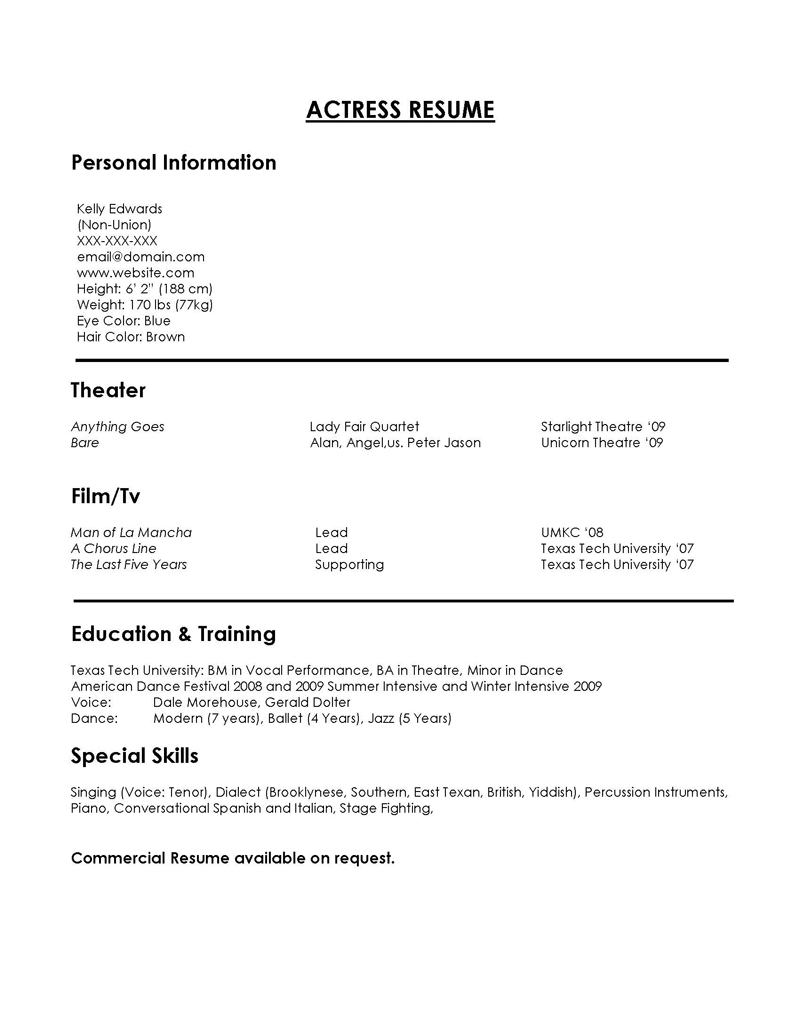
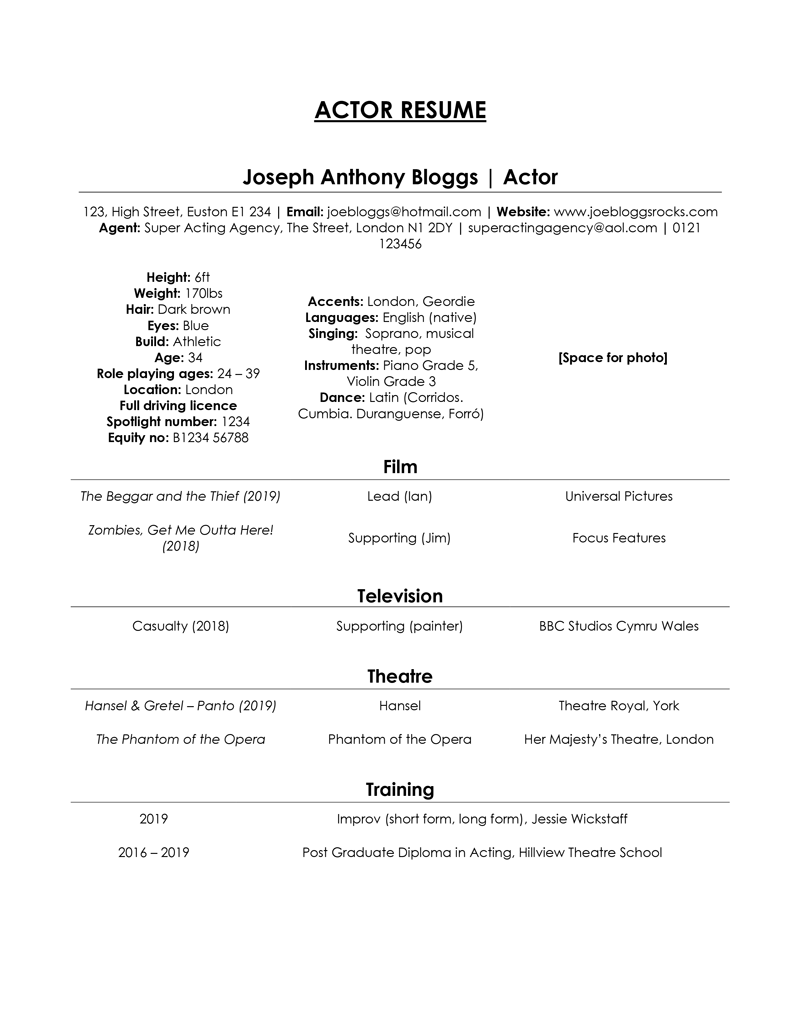
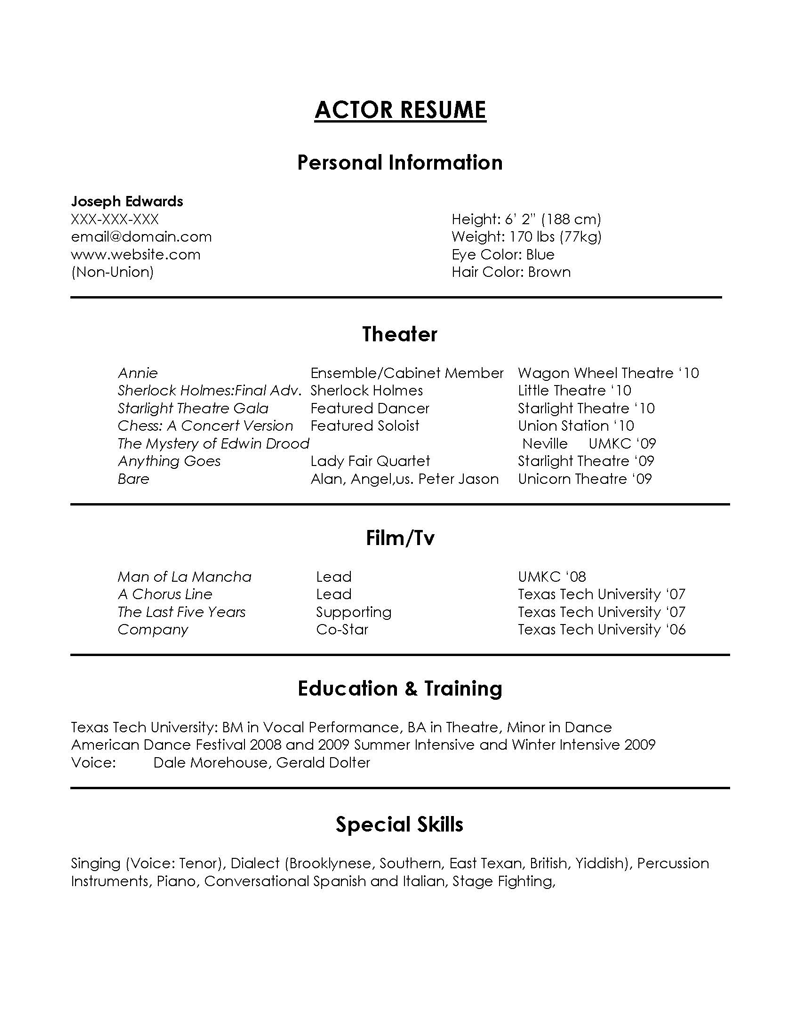
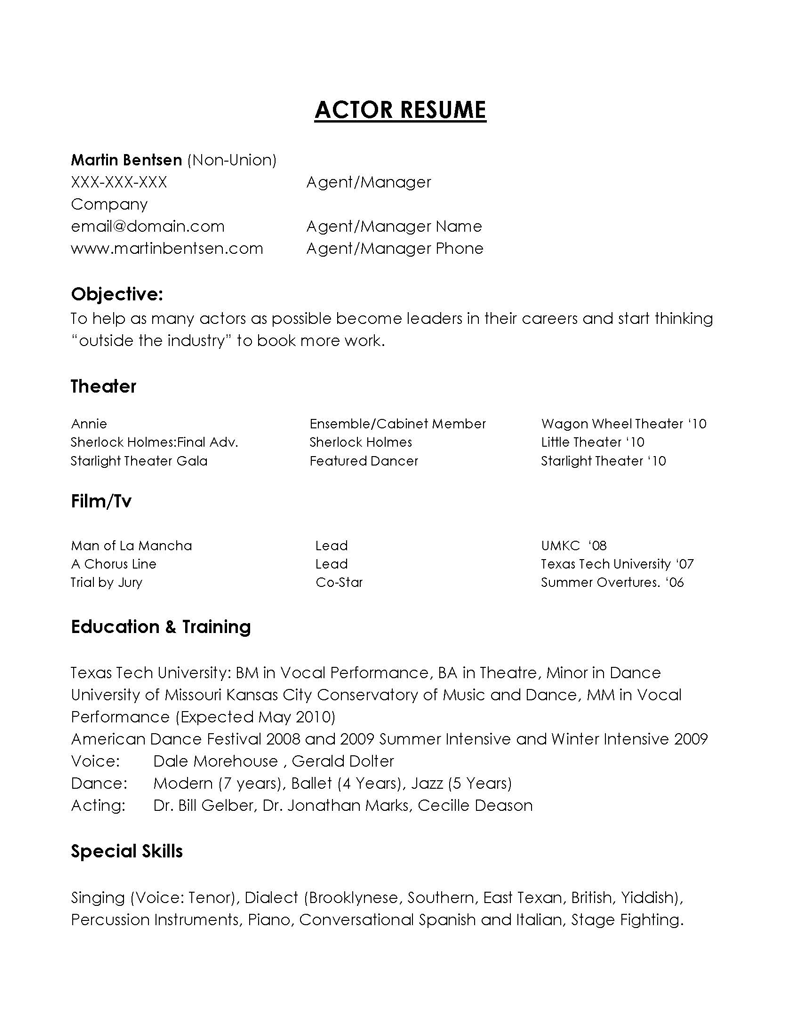
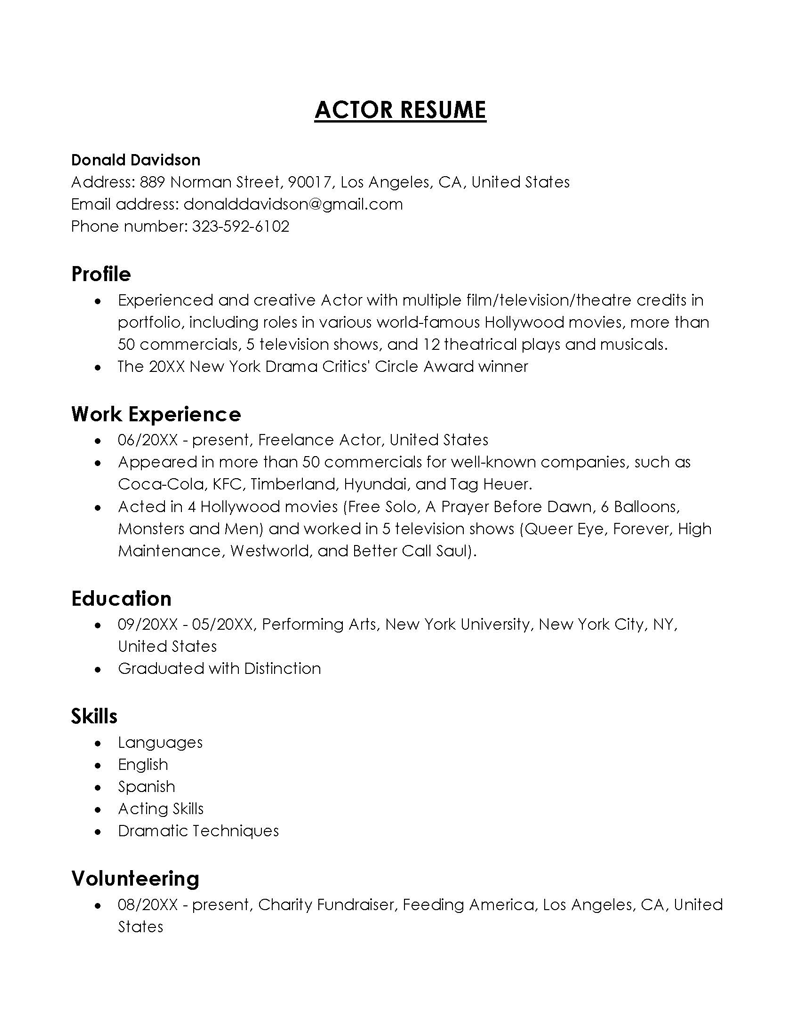
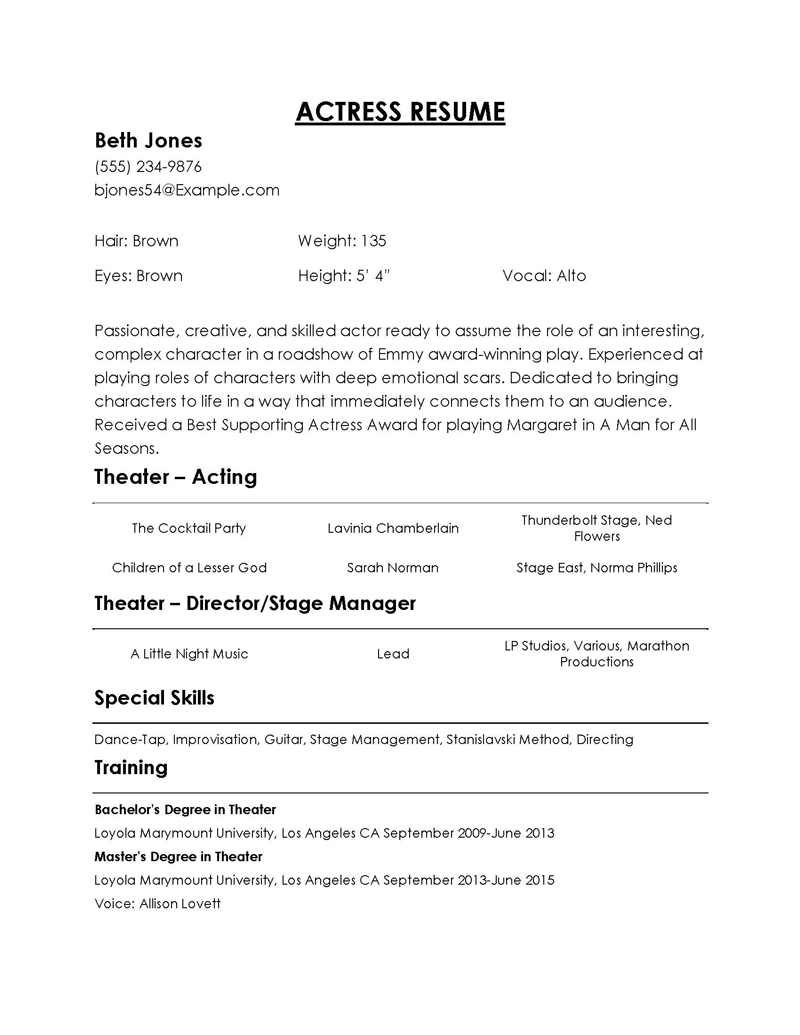
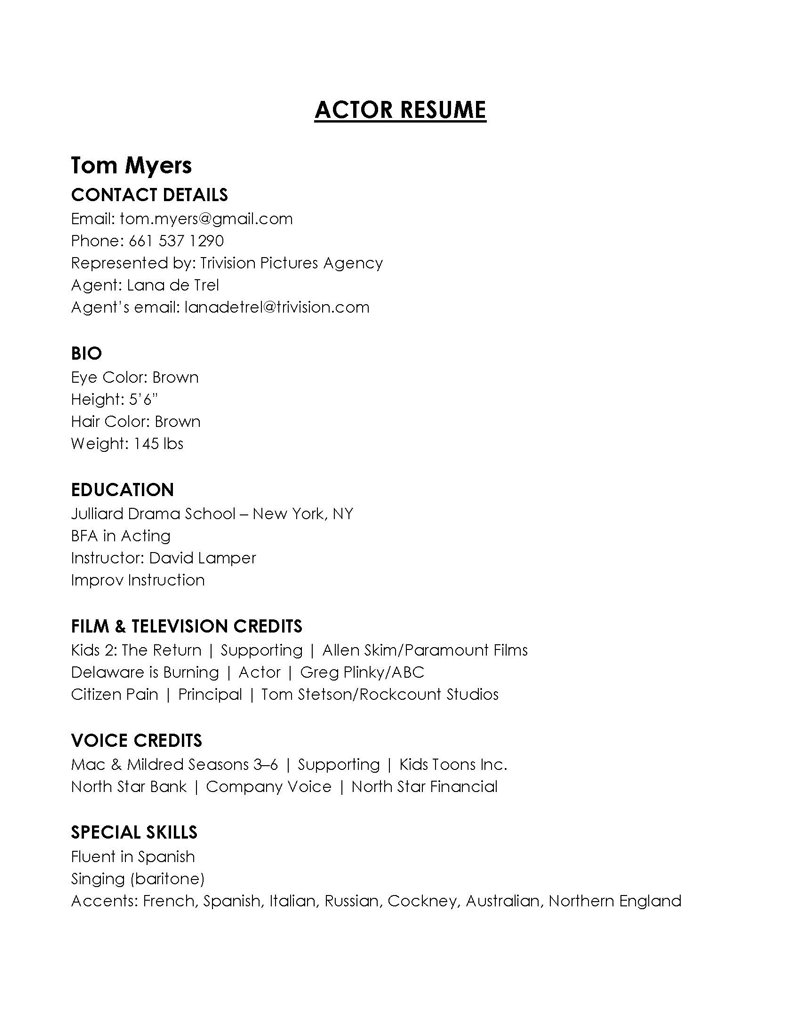
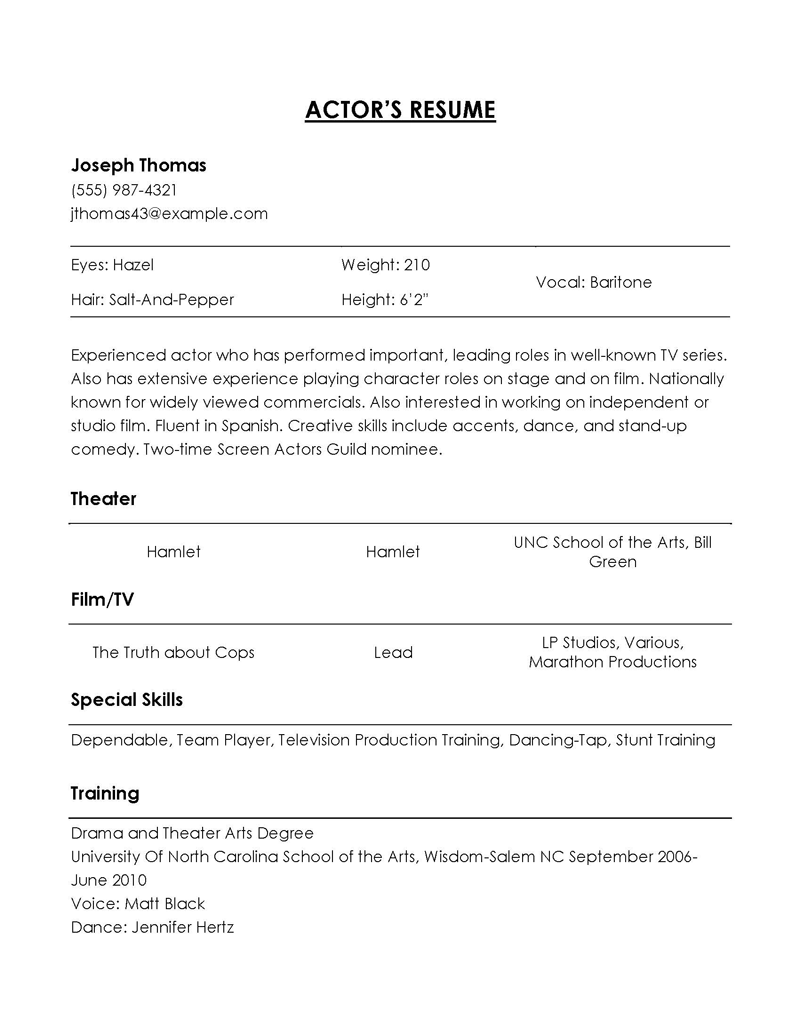
Tips
When writing a resume, there are some practices that you should consider. These practices will help make your resume more effective.
They include the following:
- Your resume should be one page long.
- Fonts like Times New Roman, Calibri, or Arial should be used to ease readability.
- Create a resume for specific roles. For instance, you can create one for stage acting and film. This will help focus your resume on the casting director’s area of interest.
Format of the Resume
When creating an actor’s resume, it is important to follow formatting guidelines that will make your resume easy to read and professional-looking. The design of your document should be clean and simple, with a basic font such as Arial or Times New Roman, and clear headings and bullet points. It is also important to keep it concise, limiting it to no more than one or two pages in length.
Your information should be organized logically, starting with your name and contact information at the top of the page, followed by your professional summary or profile. Separate sections should be used to list your experience, training, special skills, and awards, with the most relevant information listed first. Consistent formatting should be used throughout the resume, and industry-specific keywords should be incorporated where relevant.
Finally, it is important to proofread your document carefully for spelling and grammar errors and have someone else review it for clarity and accuracy. By following these formatting guidelines, you can create an effective actor’s resume that showcases your experience, qualifications, and skills clearly and professionally.
Frequently Asked Questions
Yes, it is common practice in the acting industry to print an actor’s resume on the back of their headshot. This is known as a “resume shot” or a “headshot resume.” It is a convenient and efficient way to present both your headshot and your resume together, and it is a standard format that many casting directors and agents are used to seeing. However, make sure that the printing quality is good and the text is legible. Additionally, it is still a good idea to have a separate digital copy of your resume to send out electronically when needed.
When an aspiring actor has little to no experience, they should contain the individual’s most recent acting roles, training, and education. It should also contain a list of the actor’s unique skills, such as a second language or special awards that acknowledge the individual’s excellent work.
If you have little to no experience as an actor, there are still several key components that you can include on your resume. Start with your basic contact information and include a short objective or professional summary that summarizes your goals as an actor. List any acting classes, workshops, or theater programs you have completed, as well as any relevant special skills or talents you possess. If you have any experience performing, such as school or community theater productions, student films, or public speaking, include it on your resume. You can also list any other jobs or experiences that may be relevant to the acting industry. Finally, include a professional headshot on your resume to help casting directors remember you. While you may have little experience, presenting a professional-looking resume can still make a positive impression.








